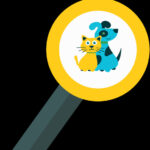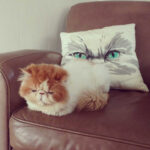Maine Coon cats, often referred to as “gentle giants,” are one of the largest domestic cat breeds, and they truly live up to their name. Originating from Maine, USA, they are the official state cat and boast a fascinating history, with some legends even linking them to Marie Antoinette’s feline companions. Regardless of their exact ancestry, Maine Coons are undeniably a robust and resilient breed, perfectly adapted to thrive in harsh climates. These impressive felines are known for their substantial size, males reaching up to 25 pounds, while females are slightly smaller, ranging from 10 to 14 pounds. However, don’t let their imposing stature intimidate you; Maine Coon cats are celebrated for their sweet, amiable personalities, as gentle and fluffy as their magnificent fur.
Understanding Maine Coon Cat Care
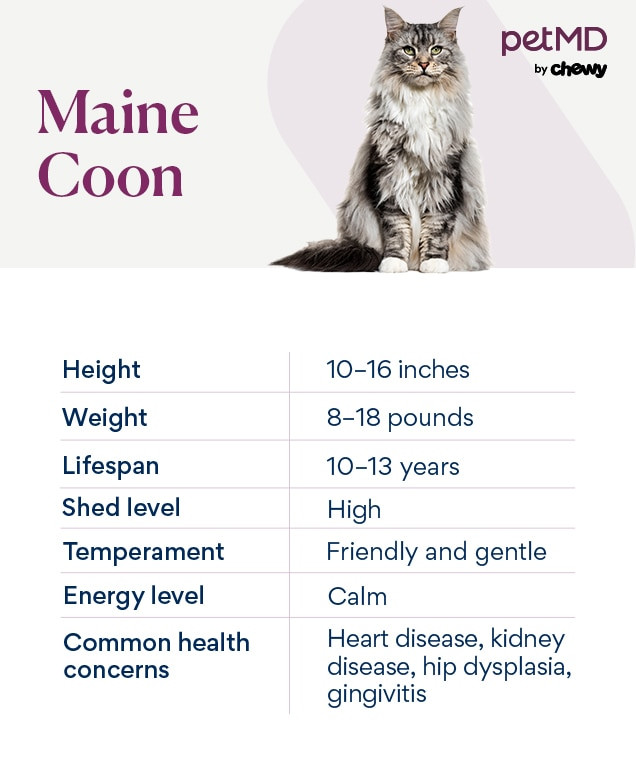 maine coon chart depicting the breed
maine coon chart depicting the breed
Maine Coon cats have become incredibly popular pets in the United States and beyond, thanks to their affectionate nature and endearing, dog-like traits. Beyond their gentle temperament, their striking physical characteristics also contribute to their popularity. Maine Coons are not only large but also possess distinctive features like elongated bodies, broad heads, and substantial paws. Their large, fur-covered paws function almost like natural snowshoes, providing excellent traction in wintery conditions. Adding to this unique adaptation, many Maine Coon cats are polydactyl, meaning they have extra toes, further enhancing their stability on slippery surfaces. Beyond their physical adaptations, Maine Coons are also known for their playful and sociable nature. They often display dog-like behaviors such as a fondness for water and a tendency to enjoy games of fetch, making them interactive and engaging companions. Overall, Maine Coon cats are known for their relaxed and friendly disposition, thriving on interaction and quality time with their human families.
Maine Coon Health Considerations
While Maine Coon cats are generally healthy, it’s important to be aware of certain health conditions to which they may be predisposed. With an average lifespan of around 13 years, Maine Coons unfortunately tend to live shorter lives compared to some other cat breeds. Furthermore, they are susceptible to inheriting specific diseases. Therefore, if you’re considering welcoming a Maine Coon kitten into your home, it’s prudent to consider pet health insurance. Here are some common health issues to be mindful of:
Hypertrophic Cardiomyopathy (HCM)
Hypertrophic cardiomyopathy, or HCM, is the most frequently diagnosed heart condition in cats. In the early stages, many cats may not exhibit any noticeable symptoms. However, as HCM progresses, it can lead to symptoms resembling heart failure, such as difficulty breathing and lethargy. Fortunately, early detection and preventative measures can make a significant difference in managing this condition:
- Genetic Testing at Home: HCM has a genetic component that varies across different breeds. Maine Coon cats are known to carry mutations in two specific genes that can predispose them to HCM. Convenient at-home DNA tests are available that can screen for these genetic mutations even before any clinical signs of the disease appear.
- Preventative Veterinary Care: The recommended preventative measure for Maine Coon cats is an annual echocardiogram, a heart ultrasound, as advised by veterinary experts. Furthermore, if you are acquiring a Maine Coon kitten from a breeder, it’s crucial to inquire about the prevalence of HCM in the cat’s lineage.
Spinal Muscular Atrophy (SMA)
Spinal muscular atrophy (SMA) is a neurological disorder that primarily affects a cat’s motor skills but does not impact their cognitive abilities. Kittens with SMA typically begin to show signs of the condition around 3 to 4 months of age. Symptoms often include reduced muscle tone and weakness, resulting in an unsteady gait and tremors. While SMA requires specific care and management, Maine Coon cats with this condition can still enjoy a fulfilling and happy life.
Polycystic Kidney Disease (PKD)
Similar to humans, a cat’s kidneys play a vital role in filtering waste products, regulating fluid balance, and producing essential hormones. Polycystic kidney disease (PKD) is a hereditary condition where cysts develop within the kidneys, leading to progressive and irreversible kidney damage.
Similar to HCM, genetic testing for PKD can be performed using at-home DNA kits, even before any symptoms manifest. If you are working with a reputable Maine Coon breeder, ensure to ask if both parents have undergone genetic testing for PKD.
Hip Dysplasia
If your Maine Coon cat is showing reluctance to use stairs, avoids jumping onto elevated surfaces, or has difficulty squatting in the litter box, hip dysplasia could be the underlying cause. Hip dysplasia in cats occurs when the hip joint doesn’t develop properly, resulting in a loose and unstable joint, which can eventually lead to arthritis. Managing hip dysplasia typically involves weight management, a diet enriched with joint-supporting supplements, and in severe cases, surgical intervention.
Chronic Gingivitis
Gingivitis, characterized by gum inflammation, is considered the initial stage of periodontal disease. While all cats are susceptible to gingivitis, Maine Coon cats have a higher predisposition to developing feline juvenile gingivitis, sometimes as early as 7 months old. The most effective ways to prevent oral disease include daily teeth brushing and regular veterinary dental check-ups.
Nutritional Needs of Maine Coon Cats
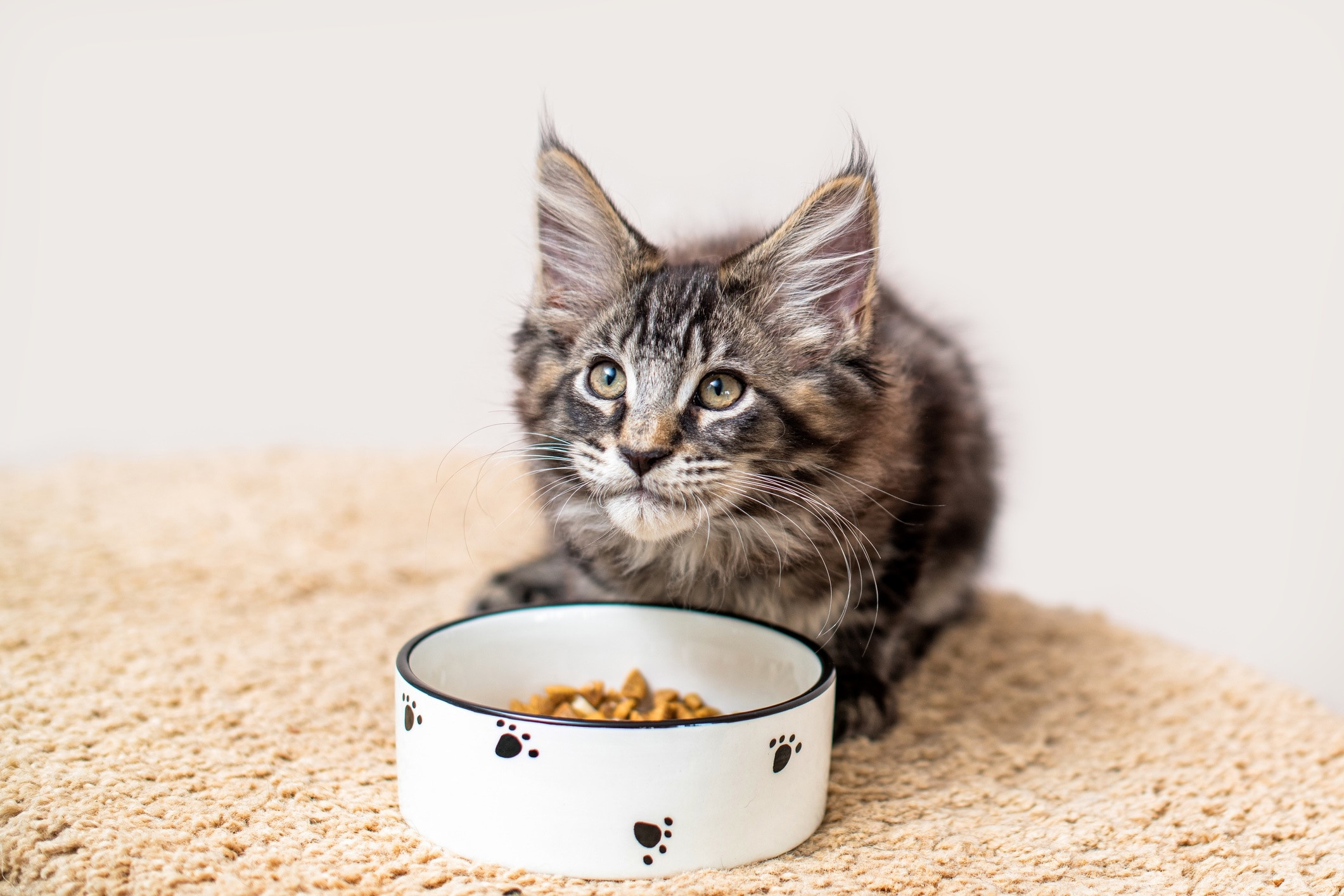 tabby maine coon kitten eating from a bowl
tabby maine coon kitten eating from a bowl
Maine Coon cats have dietary requirements similar to other cat breeds, primarily needing food rich in animal protein. It’s important to choose cat food labeled with a nutritional adequacy statement from the Association of American Feed Control Officials (AAFCO) that is appropriate for their specific life stage, whether kitten, adult, or senior.
Royal Canin offers specialized diets formulated specifically for Maine Coon cats. For Maine Coon kittens, Royal Canin’s Maine Coon Kitten food is recommended to support their growth, followed by the adult maintenance formula once they reach 2 years of age.
Feeding Practices for Maine Coons
Due to their exceptionally long whiskers, Maine Coon cats often prefer wide and shallow food and water bowls to prevent whisker fatigue, a condition caused by whisker sensitivity and overstimulation.
While water fountains are a great way to encourage hydration in cats, Maine Coons’ fascination with water might lead to playful pawing in the fountain!
Determining Food Portions for Maine Coons
The appropriate amount of food for your Maine Coon cat depends on several factors, including their weight, activity level, overall health, and age. Refer to the feeding guidelines on your chosen cat food packaging as a starting point. However, the most accurate and personalized feeding recommendations should come from your veterinarian, who can assess your cat’s individual needs.
Important Nutritional Tips for Maine Coons
Cat foods carrying an AAFCO nutritional adequacy statement are designed to provide complete and balanced nutrition for your cat’s life stage. Kittens should be fed diets formulated for growth or “all life stages,” while adult cats need age-specific adult formulas. Generally, supplements are not necessary unless specifically recommended by your veterinarian. However, proactive pet parents might want to discuss joint supplements with their vet, especially considering the Maine Coon’s size and predisposition to joint issues.
Maine Coon Behavior and Training Insights
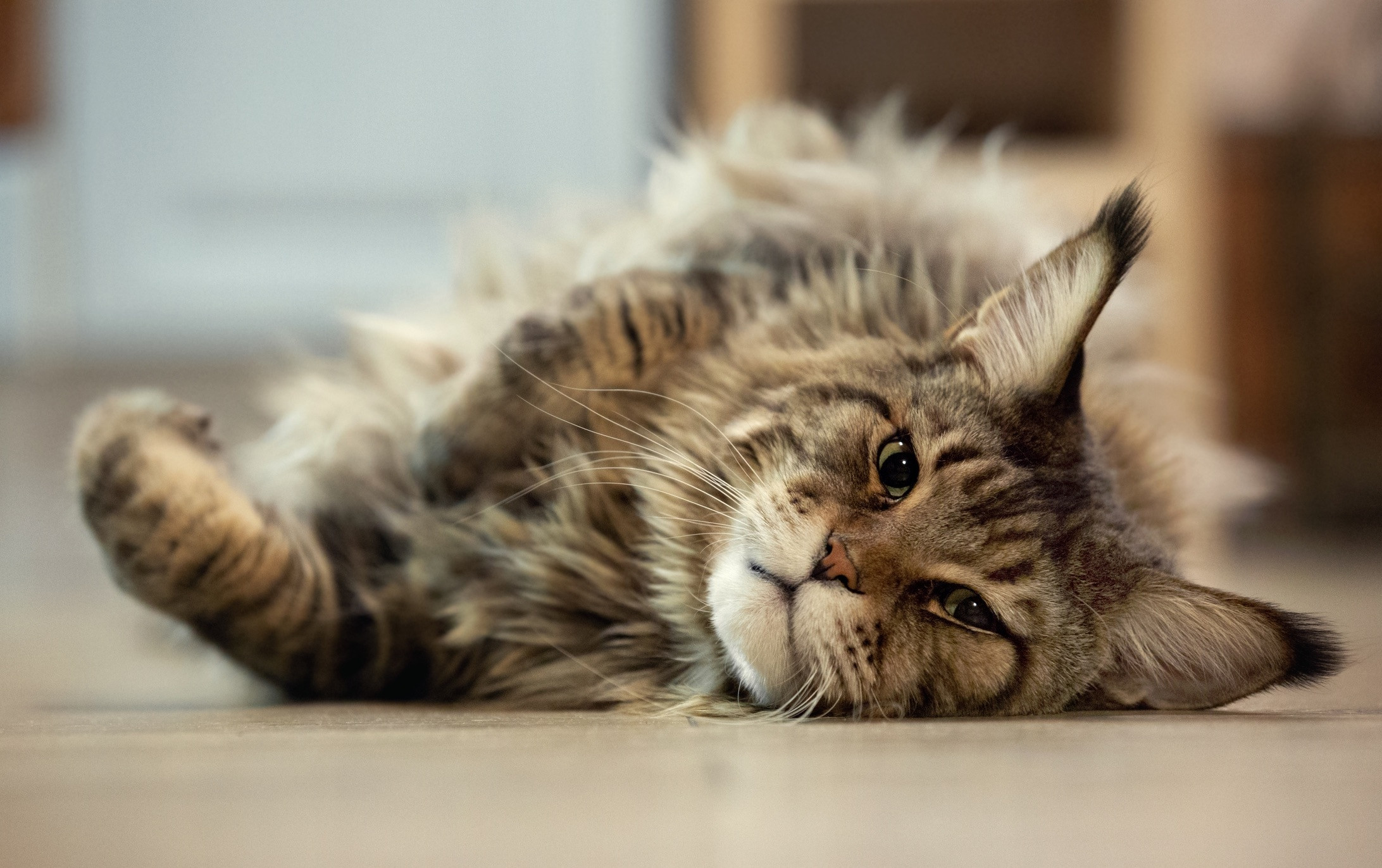 brown tabby maine coon lying on his side
brown tabby maine coon lying on his side
While each cat has its unique personality, Maine Coon cats are generally known for their relaxed and affectionate nature, making them wonderful companions.
Maine Coon Personality and Temperament Traits
The mellow temperament of Maine Coon cats makes them excellent family pets. They typically get along well with children and other animals, earning them the reputation of being “perfect family cats.” Despite their large size, Maine Coons are gentle, affectionate, and known for being less vocal than some breeds. Instead of frequent meowing, you’re more likely to hear them chirp, chatter, and trill, adding to their unique charm.
Understanding Maine Coon Behavior
Like all cat breeds, Maine Coons require daily interaction and exercise to maintain their physical and mental well-being. Engaging in playtime with your Maine Coon for at least 10 minutes daily can help prevent undesirable behaviors like excessive vocalization and destructive scratching.
Although they enjoy playful bursts of energy, Maine Coon cats are also content to spend a significant portion of their day napping in their cat bed, basking in a sunny spot, or relaxing alongside you on the couch.
Training Maine Coon Cats
Litter box training is usually straightforward for most cats when the litter box is appropriately placed and set up. However, Maine Coons are intelligent and curious cats, making them capable of learning beyond just litter box habits. Using positive reinforcement techniques and clicker training, Maine Coons can learn fun tricks, such as giving “high fives,” and practical commands like coming when called. Training provides mental stimulation for your Maine Coon and strengthens the bond between you and your feline friend.
Fun Activities for Maine Coons
- Playing fetch
- Sunbathing on window perches
- Leash and harness walking (with proper training)
- Birdwatching from a catio (cat patio)
- Puzzle toys and interactive games
Maine Coon Grooming Essentials
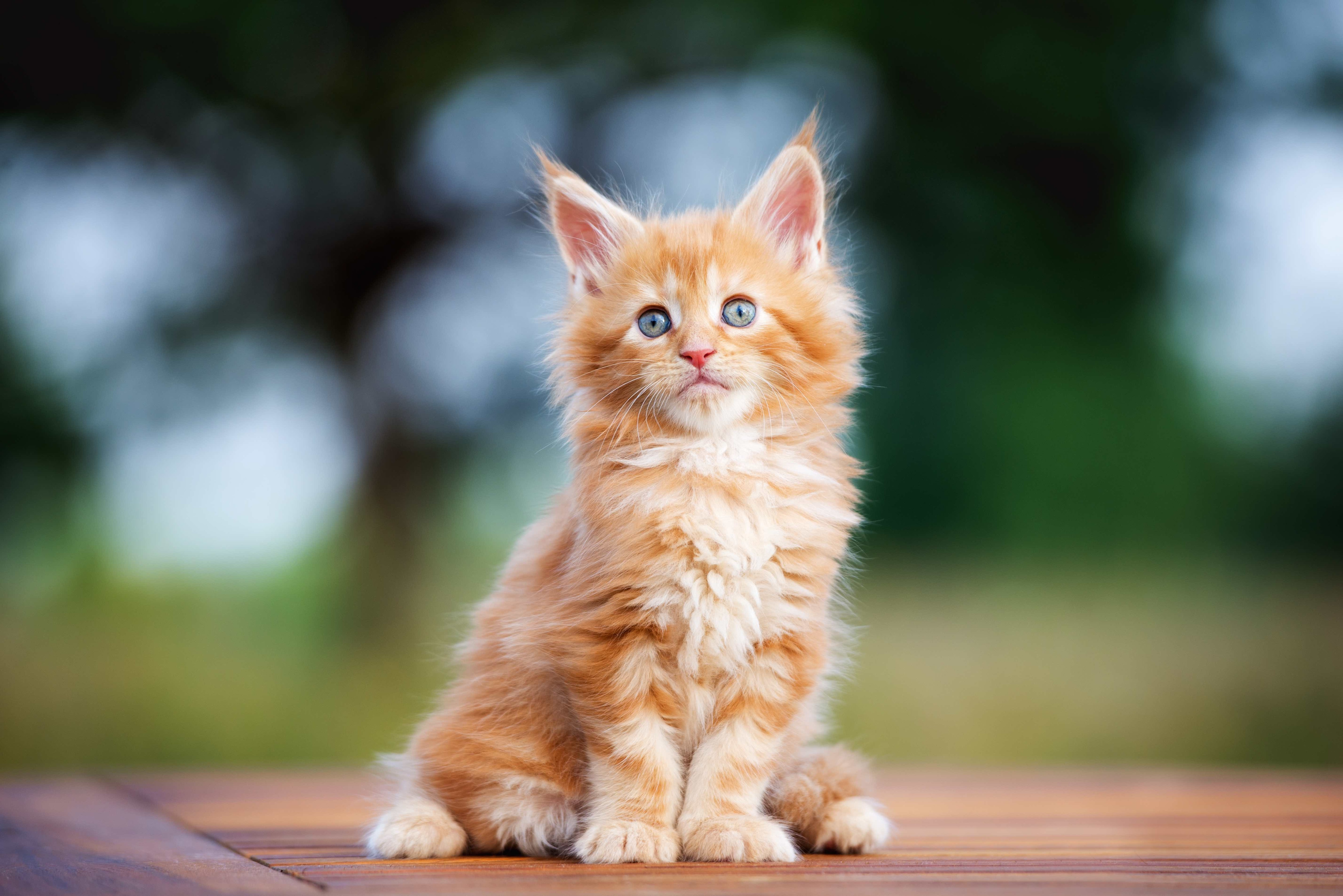 fluffy orange maine coon kitten
fluffy orange maine coon kitten
Maine Coon cats possess thick, long coats that require regular grooming to prevent matting and keep their fur healthy and free of excess oil. Here’s a guide to their grooming needs:
Skin Care for Maine Coons
If you notice an oily buildup in your Maine Coon’s coat, it might be time for a bath at home. Most Maine Coon cats are relatively tolerant of bathing, especially if they are introduced to it when they are young.
Coat Care for Maine Coons
Maine Coon fur comes in a wide array of colors and patterns, from pure white to tabby, calico, and chocolate. Regardless of coat color, they all share a thick, double-layered coat that originally served to protect them from harsh Maine winters. While most modern Maine Coons live indoors, their luxurious coat still requires regular attention.
Routine brushing is crucial to prevent matting in their dense fur. Brushing your Maine Coon two to three times a week should be sufficient for most cats. If mats do develop, professional cat groomer assistance may be needed to safely remove them.
Maine Coon Eye Care
Maine Coon cats have distinctive oval-shaped eyes in shades of gold, green, and blue. Generally, their eyes don’t require special care. However, if you observe any unusual discharge, redness, or crustiness, it’s important to schedule a veterinary check-up. Cat eye problems are often easily treated with medication.
Maine Coon Ear Care
To prevent ear infections in your Maine Coon’s large ears, keep them clean and dry, especially after bathing or swimming. Signs of an ear infection include redness, odor, discharge, and head shaking or scratching. If you suspect an ear infection, veterinary attention is necessary.
Important Considerations for Maine Coon Pet Parents
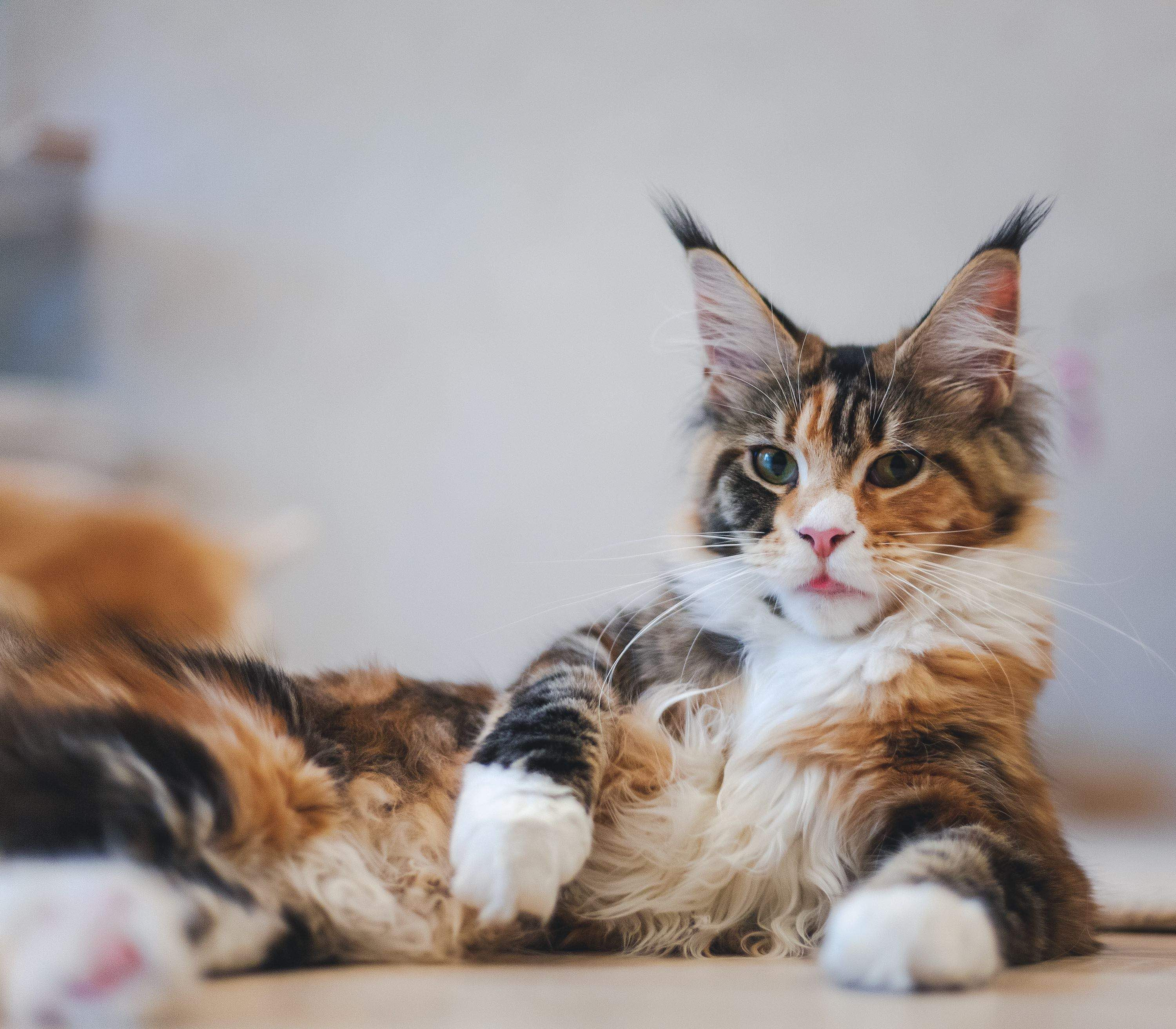 calico maine coon cat with tongue out
calico maine coon cat with tongue out
Bringing a Maine Coon kitten into your home means welcoming a new member into your family. While they might be too large to be traditional lap cats, they are incredibly affectionate and thrive on socialization with their beloved humans.
Besides quality time with their families, Maine Coons need stimulating activities to stay content. Veterinary experts recommend providing them with a substantial, tall cat tree – at least 6 feet high with a stable base – to allow them ample space for stretching and climbing. In general, everything for a Maine Coon, from litter boxes to beds, should be appropriately sized to accommodate their larger dimensions.
Maine Coon FAQs
Are Maine Coon Cats Good Pets?
Yes! Maine Coon cats are known to be wonderful companions, particularly good with children and other pets. Their intelligence and curiosity make them easily trainable and capable of learning tricks. Many owners cherish their Maine Coons for their dog-like qualities, including their love for fetching and water.
What is the Cost of a Maine Coon Cat?
The price of a Maine Coon cat typically ranges from $400 to $2,000, depending on factors like breeder reputation, lineage, and coat color. Beyond the initial purchase price, remember to budget for ongoing costs such as routine veterinary care, grooming supplies, food, and potential pet-sitting services. Consider adoption as a more affordable and rewarding option; you might find a Maine Coon or Maine Coon mix at your local animal shelter or a breed-specific rescue organization.
How Big Do Maine Coon Cats Get?
Maine Coon cats are indeed impressively sized, being one of the largest domestic cat breeds. Males can weigh between 18 to 25 pounds, while females typically range from 10 to 14 pounds.
Featured Image: iStock/nikkytok
WRITTEN BY
Janelle Leeson
Freelance Writer

